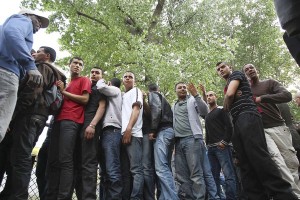Tunisian migrants squatting in Paris building refuse to leave
By Kim Willsher, Los Angeles Times, May 4 2011
Reporting from Paris— Tunisian migrants have occupied a Paris building deemed unsafe, refusing pleas to leave and offers of alternative housing Tuesday. The 130 migrants, calling themselves the Lampedusa Tunisian Collective, are mostly young adults and minors. Many say they fled instability in their homeland, where the so-called jasmine revolution overthrew longtime leader Zine el Abidine ben Ali in January.
They headed to France after making a perilous journey by boat to Italy, where authorities gave the migrants temporary papers allowing them to travel freely within 25 European countries. Since arriving in Paris, they have been sleeping in subway stations and parks across the city, dodging police attempts to round them up and send them back to Italy.
They moved into the rundown building Monday.
“We are tired, we are hungry, we want papers and freedom,” one of the migrants calling himself Makki told reporters outside the site. From the window a banner fluttered in the breeze, reading: “No police. No charity. A place to organize.”
“We have been living outside, spending 24 to 36 hours without sleep,” said Omeyya Sedik, a self-appointed spokesman for the group. “We are afraid, we are cold and we are without any of the fundamental basic requirements for daily life.”
He appealed for food, blankets and accommodations.
The squatters’ plight threw the spotlight on the problem of those fleeing instability in North Africa for Europe.
Italy has borne the brunt of the migration wave. The United Nations estimates about 28,000 migrants, including 23,000 Tunisians, have landed there since mid-January. Many travel via Lampedusa, an Italian island in the Mediterranean, from which the squatters drew their name.
When neighboring countries refused to take a share of migrants, the Italians granted them provisional permission to remain for six months. Clutching their papers, most of the French-speaking Tunisians disappeared over the border to France.
Paris was furious and reacted by tightening border controls and returning migrants to Italy. It also barred a train load of Tunisian migrants from crossing its border last month, leading Italian officials to formally protest to the European Union about France’s un-European behavior. France in turn has demanded that the EU reconsider its open-border policy in “exceptional circumstances.”
The EU has written to France and Italy demanding they explain their reaction to the influx of migrants and giving them two weeks to reply.
EU spokesman Marcin Grabiec told reporters in Brussels that European officials wanted to know how the provisional permits were being granted and controlled as well as “precise information” from France on the number of police checks at the Italian border and figures on how many people it had sent back to Italy.
The political rows, however, were of little concern to the Paris squatters Tuesday.
“I’ve had no peace since I left Tunisia at the end of January,” said Makki, who described how he spent 22 hours on a boat trying to reach Italy before traveling to Nice, Marseilles and then Paris. He said he had been sleeping outdoors and evading the police.
Before squatting in the building in north Paris, many of the migrants were occupying a nearby park. They left after police carried out raids last week at parks across the city.
Afterward, Mayor Bertrand Delanoe went on French radio to describe the police raids as shocking and to demand they stop. He said the migrants should be treated with humanity and dignity.
However, hard-line Interior Minister Claude Gueant, who has pledged to crack down on immigration, said: “These people are in an irregular situation and should be placed in administrative detention before being driven back to the border.”
Officials at Paris City Hall, which owns the squatted building, said it was dangerous and carried a “risk of fire.” A well-known group of Paris squatters called Black Thursday briefly occupied the building last month but left quickly for its own safety.
Willsher is a special correspondent.
Copyright © 2011, Los Angeles Times




